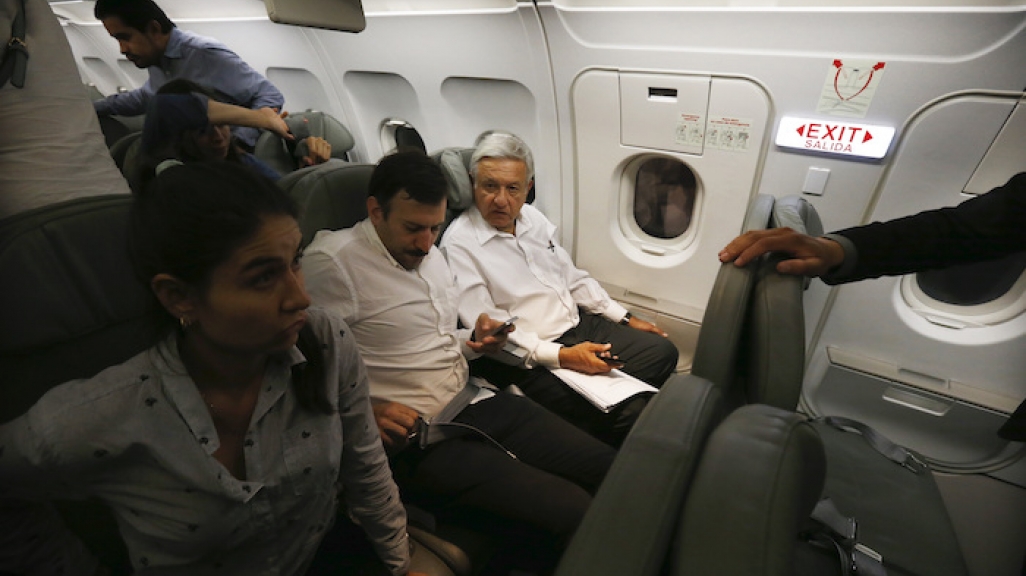AS/COA Insider: Carin Zissis on AMLO's First Year
AS/COA Insider: Carin Zissis on AMLO's First Year
“We are still very far away from seeing what the results will be,” says AS/COA Online’s editor-in-chief as Mexico’s president faces security and economic challenges.
Mexican President Andrés Manuel López Obrador, or AMLO, marks one year in office on December 1. AMLO’s Fourth Transformation of Mexico project faces tough hurdles, from the country’s rising homicide rate to a stagnant economy. AS/COA Online Editor-in-Chief Carin Zissis, based in Mexico City, comments the president’s first year and how, despite tough challenges, the president has managed to keep his approval ratings high—thus far.
- Video: AMLO's First Year – The Economic Scenario in Mexico
- To speak with an expert on this topic, please contact mediarelations@as-coa.org.
AS/COA Online: AMLO proposed Mexico's so-called Fourth Transformation during the campaign. What has been AMLO's main focus as president this first year?
Carin Zissis: When he was running his campaign, his main issue was corruption. He was running at a time when the government had been facing a large number of scandals and there was general discontent over corruption across the country. One idea of this transformation is that he would come in and change this about Mexico, this path of corruption.
It’s only been a year, so it’s difficult to say that this transformation has taken hold. We have seen some cases of people being held accountable. For example, we saw a Supreme Court justice step down due to concerns about a corruption scandal and we’ve seen the head of the Pemex oil-workers union, who ran the union for more than 20 years, step down from his post. So we’ve seen some big figures take a hit in this area. However, there have also been some concerns that the AMLO administration isn’t doing enough in terms of institution-building or laying a path for improving rule of law in a way that could mean in the future change in a real, substantive way.
On top of that, AMLO has to some degree been unclear whether he is going to forgive his predecessors. One of his big campaign promises was abrazos, no balazos—hugs, not bullets—and part of that was this idea of, “We’re going to come together and there’s going to be peace.” He has not gone after, at least not in terms of real processes, many of his political predecessors.
AS/COA Online: We know that one of Mexicans' top concerns is security, and 2019 is on target to be the most violent on record in terms of homicide rates. How is AMLO responding to this challenge?
Zissis: He inherited an incredibly difficult problem. Mexico’s homicide rate has been increasing each year in recent years, and the murder rate has generally run high since an offensive against organized crime began in 2006. So it’s not a new problem, and it’s a lot to expect that he’s going to be able to tackle it in a year.
Now, with incidents such as the botched arrest of Ovidio Guzmán in Sinaloa or the Lebarón massacre, the real question is when will people stop seeing it as a problem that was caused by his predecessors and when will they start seeing it as a problem that is now purely his?
AMLO has a majority in Congress and in partnership with Congress there had been constitutional reforms to create a National Guard, a large body that incorporates members of the armed forces and federal police. That body was created in order to target organized crime, but there are a lot of unanswered questions about how it will operate. And given the demands placed on Mexico by the U.S. government, much of the National Guard has been diverted to border areas to handle the influx of migrants traveling through Mexico to get to the United States, rather than necessarily to handle organized crime. So, while this has been a major initiative of his first year in office, we are still very far away from seeing what the results will be.
AS/COA Online: Mexicans are facing these levels of violence along with a stagnant economy and GDP growth close to 0 percent. AMLO has managed to maintain high approval ratings. How does he do this? Do you see a difference in how AMLO speaks with his constituency in relation to past governments?
Zissis: Very much so. His predecessor, Enrique Peña Nieto, barely held press conferences. AMLO holds a press conference every morning that’s broadcast from the National Palace. By having a mañanera—a daily morning press conference that is released on YouTube, Spotify, streamed live, carried by major media news outlets—he delivers his message directly.
On top of that, he spends a lot of his weekends traveling throughout the country, going to all different types of cities, all different parts of the country, often times speaking directly to his supporters. He does this with little protection and he’s very much in and among crowds, in and among the people. I would say that this is one of the reasons why he has maintained such high levels of popularity. Now, we see a lot of polarization and fighting on social media. But, in general, a lot of what he’s doing is being out there and being on the ground. And in doing so, a lot of his supporters feel heard.
On the other hand, we know it’s not uncommon for Mexican presidents to be popular in their first year. We’ve seen some indications recently that, given growing security concerns, his approval rating might weaken.
AS/COA Online: AMLO didn’t come to the UN General Assembly and hasn’t left the country during this first year in office. Do you think he’s adopting a different tone for Mexico’s foreign policy?
Zissis: Without a doubt. He actually hasn’t left Mexico since September of 2017, so we’re going on more than two years since López Obrador has left the country. And it’s not really surprising because he hasn’t hidden the fact that he wants to prioritize domestic policy over foreign policy. He has left a lot of foreign policy—a lot of the travel to international summits—to Marcelo Ebrard, the foreign minister. And he has been known to say that the best foreign policy is domestic policy. So it’s really no shock that he hasn’t traveled.
This is a big change from the most recent governments in the sense that we saw his predecessors trying to place Mexico on the global stage, make Mexico have more of a global presence, pursuing free trade agreements across the globe. But as much as AMLO might be returning to a non-interventionist foreign policy of yore, there are some issues that go beyond Mexico’s border that he can’t just ignore. For example, the issue of Central American migrants—or migrants from all over the world really—trying to travel through Mexico and dealing with an often demanding U.S. government at a time when AMLO is trying to make the USMCA accord a reality. And now, his government has become engaged with issues such as the exile of [former Bolivian President] Evo Morales, who has been giving interview after interview while in Mexico and being very visible while here.
So it’s a case where, while AMLO is trying to focus very much on domestic policy, at times the rest of the world invades that vision.
This interview was lightly edited for length and clarity.









